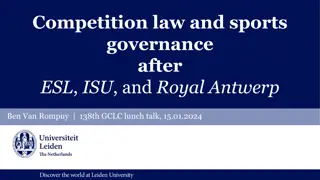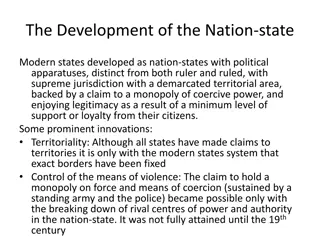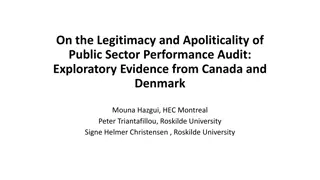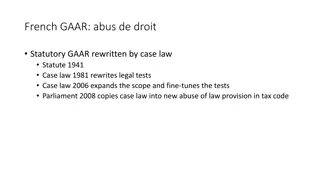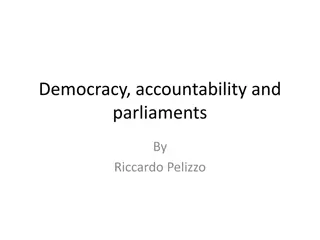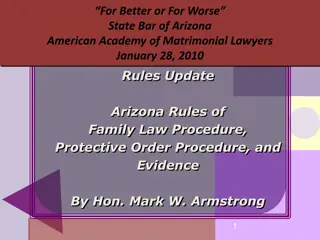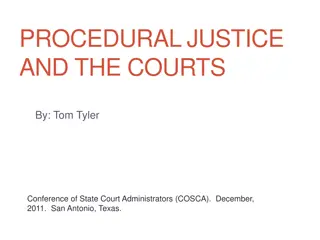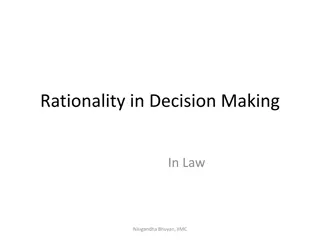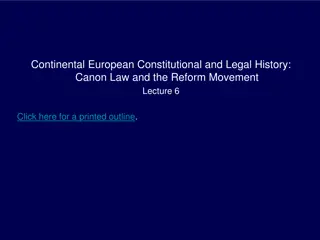Understanding Legitimacy in Family Law
Legitimacy in family law refers to the status acquired by a person born in lawful wedlock, as opposed to illegitimacy where a child is born out of wedlock. Legitimation is the process through which an illegitimate child gains legitimate status. In Nigeria, customary law also recognizes legitimacy based on certain criteria, ensuring inheritance and other rights for legitimate children.
Download Presentation

Please find below an Image/Link to download the presentation.
The content on the website is provided AS IS for your information and personal use only. It may not be sold, licensed, or shared on other websites without obtaining consent from the author. Download presentation by click this link. If you encounter any issues during the download, it is possible that the publisher has removed the file from their server.
E N D
Presentation Transcript
Family Law Legitimacy
Definition of terms Legitimacy is the status acquired by a person who is born in lawful wedlock. Illegitimacy is a condition that exists before the law or the social status of a child born out of wedlock. It can also be said to be the condition of one whose parents were not married at the time of his or her birth. Legitimation is the process through which a child who has not been born in a lawful wedlock, acquires the status of a legitimate child, which is as a result of some acts which includes the subsequent marriage of his parent or by acknowledgement by his father after the date of his birth. It is important to determine the status of an illegitimate child to assure the succession right of the child as an illegitimate child has no succession rights as against a legitimate child.
Legitimacy is the status of a child who is born to parents who are legally married to one another or who is born shortly after the parents marriage ends through divorce. Legitimacy is of great importance, in that only legitimate children can inherit their father s estates, and also enjoy the status incident to legitimate children, which includes the right to maintenance, custody amongst other rights. In Lawal v. Younam(1961) WNLR 197 it was held that in Nigeria lawful wedlock includes not only marriage under the marriage act, but also customary law marriage and Islamic law marriage. Therefore to be legitimate at birth, the parent of the child must be lawfully married either at the time of his conception or at the time of birth.
Legitimacy under Nigerian Customary Law Generally a child is legitimate at birth if born in lawful wedlock. A child born during the subsistence and continuance of a customary law marriage is presumed to be legitimate. In Ezekiel v. Alabi (1964) 2 All NLR 43 it was held that where evidence of a lawful marriage exist, the court will not inquire into which of the husband or wives lover is the father of the child born in lawful wedlock and conceived during marital cohabitation as such an inquiry could be scandalous. In Maryam v. Sadiku Ejo (1961) NRNLR 81 it was held that a child born within ten calendar month of a divorce in Igbira customary law is regarded as legitimate child of the former husband.
In Nigeria, customary law marriages are by law legal and the children of such marriages are legitimate, as was held in lawal v younan(1961) WNLR 197. In strict customary law, the concepts of paternity, marriage and legitimacy do not and may not have necessary connection for instance, a child can be seen and regarded as legitimate if the natural parents are not married to each other and the person with respect to whom the child is legitimate is not the natural father.
In Ibo custom for instance a man who has no male child may persuade one of his daughters to stay behind and not marry, for the purpose of producing a male child, who will succeed her father thereby, Saving the father s lineage from threatened extinction and any male child produce in that manner has full rights of succession to the grandfathers land and title. Similarly, a barren wife may in a bid to fulfil her marital obligation of bearing children for her husband marry another wife for her husband, which means to provide the bride price for the marriage, children of such marriage to the other wife will be regarded as the legitimate children of the husband. It is evident that under customary law, a child may be regarded as legitimate even if the mother never acquired the status of a lawful wife and also if the putative father is not the natural father of the child.
Legitimacy of Children of Void Marriage Legitimacy of Children of Void Marriage Ordinarily, any child born of a void marriage is illegitimate, the position is not clear-cut where in Nigeria where the void marriage was celebrated under the marriage Act, as it is customary for Nigerians who desire to marry each other to be first married under customary law before contracting a marriage in accordance with the marriage Act, if the subsequent statutory law marriage is therefore void, it is submitted that the customary law marriage remains valid and a child conceived or born after the statutory marriage will be legitimate at birth because of the subsumed and existing customary law marriage.
Legitimacy of Children of a Voidable Marriage Legitimacy of Children of a Voidable Marriage At common law, a decree of nullity in respect of voidable statutory marriages was retroactive, thereby bastardizing the children of the marriage. But a major change has been affected in this respect by the Matrimonial Causes Act 1970, in its section 38 (1) of the Act, a decree of nullity in respect of a voidable marriage is effective only from the date in which the decree becomes absolute. Moreover, such decree of nullity does not render illegitimate the child of the parties born since, or legitimated during the marriage, See S38(2) MCA 1970. The child of a voidable customary law marriage is not regarded as born legitimate, but such a child may in some parts of the country, be legitimated by the subsequent acknowledgement by its natural father.
Legitimacy under English Law Legitimacy under English Law The common law is of the effects that for a child to be legitimate he or she must be born in lawful wedlock, therefore a child born out of wedlock is deemed and will be regarded as an illegitimate child. Presumption of Legitimacy at Common Law In Egwunwoke v. Egwunwoke (1966) 2 All NLR 1, (1966) NMLR 147 it was held that a child born in lawful wedlock is presumed legitimate at common law until the contrary is proved.
Presumption of Legitimacy under Statutory Law There is a statutory presumption in favour of legitimacy under statutory law, under Section 147 of the Evidence Act, a child born during the continuance of a statutory marriage or within two hundred and eighty days after the dissolution of such marriage is presumed legitimate. However the law has now been altered by the Matrimonial Causes Act 1970, section 115 (3) is of the effect that, where a person was born during the continuance of a valid marriage between his mother and any man, or within two hundred and eighty days after its dissolution, the mother remaining unmarried, the court shall presume that the person in question is the legitimate son of the man. Akparanta v Akparanta (1972)2 ECSLR 779.
By section 84 of the Act, both spouses are competent witnesses to give evidence of prove that the parties did not have sexual relations with each other at any material time. Consequently any of the parties may, adduce evidence to rebut the presumption of legitimacy of a child born during the marriage, but the spouses are not compellable, that is cannot be forced to give such evidence if it will bastardize a child born to the wife during the marriage.
Presumption of Legitimacy in Customary Law A child born during the subsistence of a customary law marriage is presumed legitimate. Ezekiel v. Alabi (1964) 2 All NLR 43. For instance under Igbirra customary law, any child born within ten calendar months of a divorce is regarded as the legitimate child of the former husband even though he cannot possibly be the father of the child. Mariyama v. Sadiku Ejo (1961) NRNLR 81. Customary Courts usually regard the customary law presumption of legitimacy as irrebuttable. The consequence of this rule is that the presumption is applied even when it is obvious that the child does not belong to the husband; the superior courts have always treated it as rebuttable. Edet v. Essien (1932) II NLR 47. Where the court held the custom to be contrary to natural justice, equity and (bride price) has not been refunded. good conscious because dowry
Legitimation Legitimation is the process by which a child who has not been born legitimate acquires a legitimate status, the process of legitimation may be achieved by the subsequent marriage of the parents of the child, or acknowledgement by its natural father, that is the recognition of paternity by its natural father. It is a way of eliminating the social stigma and discrimination attached to a child as a result of the circumstances surrounding his birth and giving a child a legitimate status, to acquire a legitimate status by legitimation, the parents of the child must have been married under the marriage act, and in some customary law by recognition of paternity by the father of the child, and by the subsequent customary law marriage of such a child parents.
The condition to be fulfilled before a child can be said to have been legitimated are provided for under the Legitimacy Act as obtainable and practicable under the Marriage Act. See section 3 Legitimacy Act The modes of legitimation are legitimation by subsequent marriage, either statutory or customary marriage and acknowledgement of the child s paternity as a means under customary law.
Legitimation by Subsequent Statutory Law Marriage The legitimation of an illegitimate child through the subsequent marriage of its parents was first made possible in Nigeria by the enactment of the Legitimacy Act 1929 Ordinance No. 27 of 1929. By Section 3(1) of the Legitimacy Act where the parents of an illegitimate person marry or have married one another, whether before or after the commencement of this Act, the marriage shall, if the father of the illegitimate person was, or is at the date of the marriage domiciled in Nigeria, render that person, commencement of the Act, or from the date of the marriage whenever last happens. if living legitimate from the
The Operation of Section 3(1) is based on the fulfilment of certain prerequisites, 1. the parents of the illegitimate person must have subsequently married each other, the marriage must be a statutory one in accordance with the marriage Act and not marriage under customary law 2. the father of the illegitimate person must be domiciled in a State in Nigeria at the time of the marriage, see section 2(3) of the MCA 3. it is essential that the person to be legitimated, must be alive at the date of the marriage.
Section 3(1) states that the effect or the marriage is to render that person if living legitimate, the legal effect of the subsequent marriage of the parents is to make the illegitimate person legitimate from the commencement of the Act or from the date of the marriage, whenever happens last, thus, is if the marriage took place before the commencement of the Act which was 17 October 1929 the illegitimate person will become commencement of the Act. If on the other hand, the marriage was celebrated after 17 October 1929, he will become legitimate as from the date of the marriage. The child of an adulterous union may be legitimated by the subsequent marriage of its parents in accordance with the legitimacy Act. legitimate as from the
Section 9(1) of the Legitimacy Act makes provision for the situation where the father of an illegitimate person was domiciled in a foreign country, if at the time of the birth of the illegitimate person, the father was domiciled in a country, the law of which does not permit legitimacy per subsequent matrimonial, but at the time of his marriage to the mother of the illegitimate child, he was domiciled in a country, the law of which such legitimation is recognized, the illegitimate person will be recognized as legitimated in Nigeria, the legitimation will be by virtue of the subsequent marriage and it takes effect from the commencement of the Act, or the date of the marriage whichever happens last.
Effect of Legitimation Effect of Legitimation The effect of legitimation is to confer on a person who was born illegitimate all the rights and obligations of legitimate persons. i.e. a legitimated person shall have the same rights and shall be under the same obligations in respect to maintenance and support as if he had been born legitimate, such person is also entitled to all rights to claims for damages, compensation, allowance or benefit which are vested in a legitimate person. See section 8 of the Legitimacy Act.
Rights of legitimate persons to interest in property Illegitimate child is disentitle from rights like, the right to maintenance, to protection from physical, mental and emotional injury and so on, however with legitimation, an illegitimate child now legitimated shall enjoy the same rights as that of a legitimate child, as if he had been born legitimate, for instance by virtue of Section 5(1) Legitimacy Law, a legitimated person, his wife and children shall from date of legitimation have the right to take interest in property on intestate or disposition occurring after the date of legitimation as if had been born legitimate.
A legitimated person will have the right to interest in property. It enable the legitimated person and his children to take as from the date of legitimation from the deceased interest disposition occurring after that date, as if he had been born legitimate, where a legitimated person participate along other children in distribution of property according to seniority. See section 5(2). Duties of a parent to a legitimated child are: maintenance of children, physical protection, education, duty to provide necessaries, etc. on intestate
Some rights are contained in the Childs right Act sections 10(1)(2), 14(2) 15(1) (2), 16(1), 17(2), see section 42(1) (2) CFRN 1999 as amended constitutional approach to the rights of legitimate and legitimated child. Also see chapter IV CFRN


